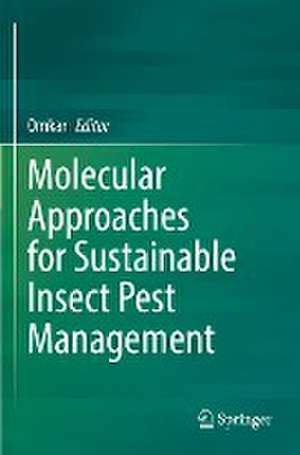Molecular Approaches for Sustainable Insect Pest Management
Editat de Omkaren Limba Engleză Paperback – 26 noi 2022
| Toate formatele și edițiile | Preț | Express |
|---|---|---|
| Paperback (1) | 1550.16 lei 6-8 săpt. | |
| Springer Nature Singapore – 26 noi 2022 | 1550.16 lei 6-8 săpt. | |
| Hardback (1) | 1556.33 lei 3-5 săpt. | |
| Springer Nature Singapore – 25 noi 2021 | 1556.33 lei 3-5 săpt. |
Preț: 1550.16 lei
Preț vechi: 1890.44 lei
-18% Nou
Puncte Express: 2325
Preț estimativ în valută:
296.62€ • 323.21$ • 249.95£
296.62€ • 323.21$ • 249.95£
Carte tipărită la comandă
Livrare economică 23 aprilie-07 mai
Preluare comenzi: 021 569.72.76
Specificații
ISBN-13: 9789811635939
ISBN-10: 9811635935
Pagini: 421
Ilustrații: XIV, 421 p. 1 illus.
Dimensiuni: 155 x 235 mm
Greutate: 0.61 kg
Ediția:1st ed. 2021
Editura: Springer Nature Singapore
Colecția Springer
Locul publicării:Singapore, Singapore
ISBN-10: 9811635935
Pagini: 421
Ilustrații: XIV, 421 p. 1 illus.
Dimensiuni: 155 x 235 mm
Greutate: 0.61 kg
Ediția:1st ed. 2021
Editura: Springer Nature Singapore
Colecția Springer
Locul publicării:Singapore, Singapore
Cuprins
Chapter 1. Host Plant Resistance.- Chapter 2. Insecticide resistance: Molecular insight.- Chapter 3. Induced Resistance and Defence Primings.- Chapter 4.Transgenic Plants Technology.- Chapter 5. Molecular Approaches.- Chapter 6. RNA Interference Technology.- Chapter 7. Proteinase Inhibitors .- Chapter 8.Hormone analogues and Chitin synthesis inhibitors.- Chapter 9. Phyto-Antifeedants. Chapter 10. Chemoecological Responses of Plants .- Chapter 11.Bioinformatics.- Chapter 12. Nanotechnology.- Chapter 13. Ethics and Safety Concerns.
Notă biografică
Prof. Omkar, FNASc, has been associated with teaching for about 35 years and research for more than 42 years. He is Former Head, Department of Zoology, University of Lucknow, Lucknow-226007,Former Coordinator, UGC-SAP (DRS-II), DST-FIST, DST-PURSE, Centre of Excellence, Govt. of UP, programs. He has worked on 10 more projects of state/central funding agencies. He specializes in Environmental Toxicology and Entomology, with particular reference to the Insect Pest Management .He is also an Associate Editor, International Journal of Tropical Insect Science, Springer Nature and Chief Editor, Journal of Applied Bioscience, besides being President of International Society of Applied Biology.
He is a receipient of several awards, like Saraswati Samman by the Department of Higher Education, Govt. of UP; Prof. T N Ananthakrishanan Foundation Award, Rescholar Award of Excellence in Agricultural Entomlogy by Association of ntomologists, Prof. G. S. ShuklaGold Medal by The Academy of Environmental Biology, Dr. S. Pradhan Memorial Lecture Award by The Devision of Entomology, IARI & The Entomological Society of India, ACCLAIM and Uddeepan awards from University of Lucknow. He is a Fellow of The Entomological Society of India, Zoological Society of India, Society for Biocontrol Advancement and Fellow of The National Academy of Sciences India (FNASc), besides many others. He has 16 books to his credit. He has published 235 Research papers, 10 Reviews, 40 Reviews as Book chapters, 17 Popular Science articles. Prof. Omkar has guided more than TWO dozen Ph. D. students. He has visited the School of Biological Sciences, University of East Anglia (2006) for three months and Department of Zoology, University of South Bohemia and Czech Academy of Sciences, Ceske Budejovice, Czech Republic (May 2016).
He is a receipient of several awards, like Saraswati Samman by the Department of Higher Education, Govt. of UP; Prof. T N Ananthakrishanan Foundation Award, Rescholar Award of Excellence in Agricultural Entomlogy by Association of ntomologists, Prof. G. S. ShuklaGold Medal by The Academy of Environmental Biology, Dr. S. Pradhan Memorial Lecture Award by The Devision of Entomology, IARI & The Entomological Society of India, ACCLAIM and Uddeepan awards from University of Lucknow. He is a Fellow of The Entomological Society of India, Zoological Society of India, Society for Biocontrol Advancement and Fellow of The National Academy of Sciences India (FNASc), besides many others. He has 16 books to his credit. He has published 235 Research papers, 10 Reviews, 40 Reviews as Book chapters, 17 Popular Science articles. Prof. Omkar has guided more than TWO dozen Ph. D. students. He has visited the School of Biological Sciences, University of East Anglia (2006) for three months and Department of Zoology, University of South Bohemia and Czech Academy of Sciences, Ceske Budejovice, Czech Republic (May 2016).
Textul de pe ultima copertă
This book offers a range of environmentally benign molecular mechanisms which are safer alternative strategies for effective insect pest management. In modern era of biotechnology, there has been much advancement in the field of molecular biology, where many more techniques have evolved which can be helpful in the field of pest management too. Plant resistance, development of transgenic plants, and many more techniques are being considered the panacea to pest problems. On the other hand, there are wide spread concerns of the safety of biotechnological interventions with nontarget organisms including humans. While the world stands divided on the ethical issues of these approaches and the many safety concerns, scientists believe that well thought of biotechnological interventions are probably the only safest ways possible for reducing pest attacks on crops. It explores various techniques and aspects related to molecular pathways for crop pest control. This book is a useful resource for postgraduate students and researchers of agriculture sciences, plant pathology and plant physiology. It is also useful for policy planners in agriculture.
Caracteristici
Elucidates the role of genetic engineering in efficient management of pest Covers ethical and safety concerns in use of transgenic for pest control Explains a range of molecular and biotechnolgical approaches for sustaiable pest management
